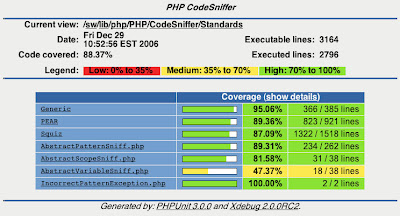Greg Beaver has posted a nice history of PEAR in 2006, entitled 2006: a PEAR retrospective. From the article:
2006 was an interesting year for PEAR, a number of exciting events happened both inside PEAR's workings and in PHP at large that affected PEAR. I will attempt to give my best shot at a 20-20 hindsight look back at PEAR in the past year.
Of course, 2006 was a big year for me in PEAR. My account was opened by Pierre in July, just a few months before he announced his retirement. The PHP_CodeSniffer proposal was submitted in July and finally approved in late August and I released the first version of PHP_CodeSniffer through PEAR in early September, a very proud moment for everyone involved at Squiz.
The first stable version of PHP_CodeSniffer is planned for release sometime in 2007, so next year should include another proud milestone for my involvement in the PEAR project.


 I'm the product development manager at Squiz Labs, managing the MySource Matrix and MySource Mini CMS development teams.
I'm the product development manager at Squiz Labs, managing the MySource Matrix and MySource Mini CMS development teams.